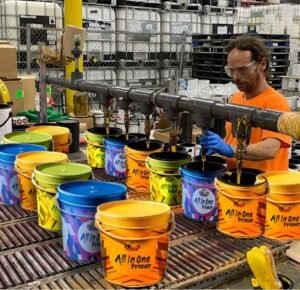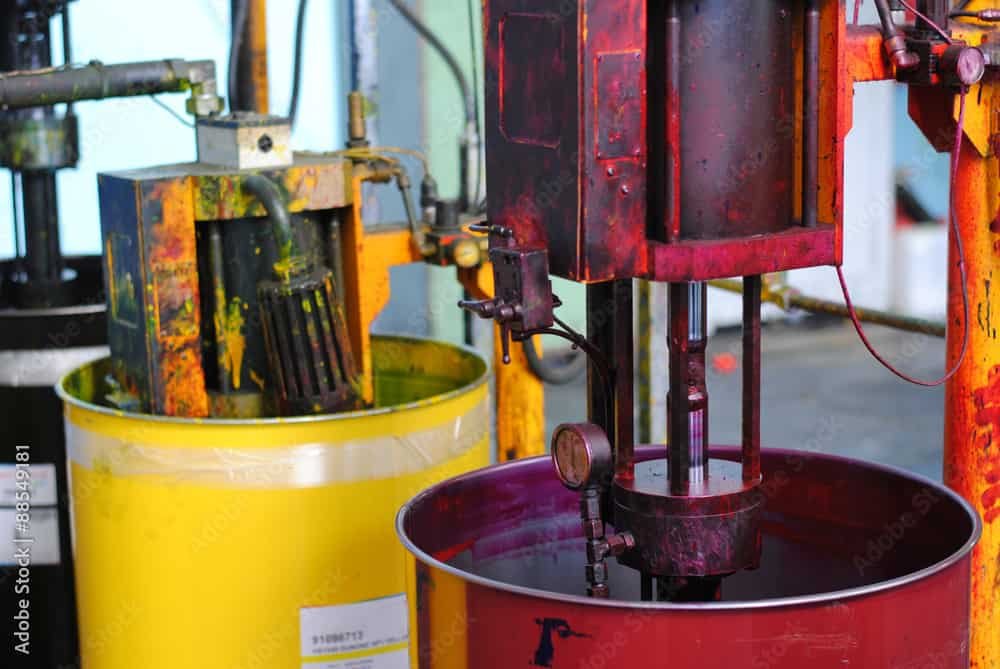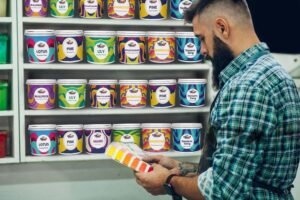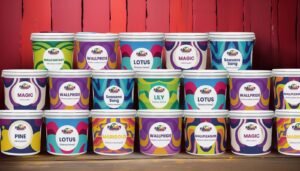Introduction to Wholesale Paint Manufacturing
Wholesale paint manufacturers play a crucial role in the paint industry by supplying large quantities of paint to various sectors, including construction, interior design, and do-it-yourself (DIY) projects. Unlike retail suppliers that cater to individual consumers or small businesses, wholesale manufacturers provide paints to retailers, contractors, and large-scale operations at reduced prices per volume. This significant difference allows wholesale entities to maintain lower costs, optimizing supply chains for commercial clients, which can include builders, decorators, and other professionals seeking to purchase bulk materials.
In the manufacturing context, “wholesale” refers to the sale of goods in large quantities, typically at a discounted rate, to be sold again by retailers or utilized directly in construction projects. This model is beneficial for both manufacturers and buyers, as it streamlines production and distribution, allowing for a more efficient flow of materials. The scale of paint production from these manufacturers enables them to focus on quality, consistency, and a variety of finishes and colors that meet the diverse needs of their clientele.
Mithila paints, known for their vibrant colors and intricate designs, exemplify how wholesale manufacturers cater to niche markets within the broader industry. The extensive range of products offered by wholesale paint manufacturers ensures that every project, whether commercial or residential, can benefit from their expertise and resources. Furthermore, the collaborative relationships between manufacturers and professionals in the construction and design industries foster innovation and creativity in paint applications, transforming spaces through color and finish.
In conclusion, wholesale paint manufacturing serves as a backbone for the paint industry, providing essential products to various sectors while facilitating economic efficiencies through bulk operations.

Types of Paint Manufactured by Wholesalers
Wholesale paint manufacturers provide a diverse array of paint types that cater to different needs across various industries. Understanding these types can significantly assist customers in selecting the right products for their projects. Among the primary categories are water-based, oil-based, latex, acrylic, industrial, and specialty paints, each serving unique purposes and applications.
Water-based paints are distinguished by their solvent composition, using water as the primary solvent, which makes them easier to clean and less toxic compared to other options. Often employed in residential and commercial settings, water-based formulations dry quickly and exhibit low levels of volatile organic compounds (VOCs). This category significantly benefits households and businesses striving for a healthier environment.
In contrast, oil-based paints utilize organic solvents, resulting in a sturdy finish and high durability. These paints are preferred for wood surfaces, metal items, and areas subjected to heavy wear. Their slower drying time allows for extended workability, but users should account for prolonged odor and VOC emissions during application.
Latex paints are a popular choice, particularly in modern residential projects. These are water-based, non-toxic, and available in a variety of finishes, making them suitable for interior walls and ceilings. Their high flexibility and easy clean-up contribute to their widespread use among DIY enthusiasts.
Acrylic paints, another form of water-based paint, contain acrylic resins which provide enhanced durability, color retention, and resistance to environmental factors. These paints are particularly favored for their versatility and ability to bond with multiple surfaces, including canvas and paper.
Industrial paints are specially formulated to withstand harsh conditions associated with factories and warehouses. These coatings are essential for machinery and equipment, ensuring longevity and protection against corrosion and rust. Lastly, specialty paints address specific requirements, encompassing anti-graffiti, non-slip, and fire-retardant formulations designed for particular applications.
In conclusion, wholesale paint manufacturers offer an extensive range of products to meet the diverse needs of consumers. Understanding the characteristics and applications of various paint types is crucial for making informed decisions in any painting project, especially when considering options like mithila paints, which add cultural significance and vibrancy to designs.

The Process of Paint Manufacturing
The manufacturing of paint involves a systematic approach that is both intricate and technologically advanced. The process begins with formulation, where raw materials are precisely selected based on the desired properties of the final product. Components such as pigments, binders, solvents, and additives are chosen to achieve the desired color, texture, and performance. It’s crucial for manufacturers, including those producing mithila paints, to maintain consistency in their formulations to meet customer expectations.
Once the formulation is established, the next step is mixing. In this stage, materials are combined using sophisticated equipment such as high-speed dispersers and bead mills. These machines are designed to ensure thorough mixing and uniform dispersion of pigments throughout the binder, creating a homogeneous mixture. The ability of the equipment to produce fine particle sizes enhances the paint’s finish and durability. This stage is vital for manufacturers of mithila paints, as it directly affects the aesthetic qualities and effectiveness of the final product.
Quality control is another essential aspect of the paint manufacturing process. Samples are taken during various stages of production to ensure that the mixture adheres to the established specifications. Laboratory tests assess factors such as viscosity, color accuracy, drying time, and resistance to environmental factors. Adhering to industry standards and regulations is paramount to ensure product safety and quality. Compliance not only guarantees the performance of the paints but also the safety of consumers, as some components can be hazardous if not handled correctly.
Finally, once the paints meet all quality standards, they are packaged for distribution. Proper packaging is crucial to prevent contamination, degradation, or damage during transport. Manufacturers often utilize advanced technologies for filling, sealing, and labeling, ensuring that the product reaches retailers in pristine condition. This entire process underscores the expertise of wholesale paint manufacturers, including those specializing in mithila paints, in delivering high-quality solutions to the market.

Benefits of Sourcing from Wholesale Paint Manufacturers
Purchasing paints directly from wholesale manufacturers presents numerous advantages for businesses and professionals in the painting and construction sectors. One of the most significant benefits is the potential for cost savings. When businesses source mithila paints and other products in bulk, they often gain access to lower prices compared to retail outlets. This reduction in cost can be attributed to decreased overhead expenses experienced by manufacturers, which can subsequently be passed on to the buyers, allowing for better profit margins or more competitive pricing in their services.
Another compelling reason to consider wholesale sourcing is the flexibility of bulk purchasing options. When dealing directly with manufacturers, businesses can negotiate quantities tailored to their specific needs, rather than being constrained by retail stock limitations. This ensures that professionals always have sufficient supplies of mithila paints and other necessary products on hand, minimizing delays on projects and improving overall efficiency.
Wholesale manufacturers also typically offer a wider variety of products, which includes various types, colors, and finishes of paints. This vast selection allows professionals to find unique solutions for each project, catering to specific customer preferences or requirements. Furthermore, the access to specialized paints, such as eco-friendly or high-durability options, ensures that contractors can meet the diverse needs of their clients effectively.
In addition to these benefits, establishing a strong relationship with wholesale paint manufacturers can have long-term advantages. A solid partnership means that businesses can receive personalized support, stay updated on new products, and benefit from exclusive promotions or discounts. This strong communication can lead to better service overall, ensuring that the needs of the business and its customers are aligned. Ultimately, sourcing from wholesale manufacturers can significantly enhance operational efficiency and product offerings in the highly competitive painting industry.
Choosing the Right Wholesale Paint Manufacturer
Selecting the appropriate wholesale paint manufacturer is a critical decision for both businesses and individuals involved in painting projects. The right choice can significantly impact the quality of the final outcome and the overall satisfaction with the products used. When considering wholesale paint manufacturers, there are several key factors to keep in mind.
Firstly, the manufacturer’s reputation plays an essential role. Researching reviews, testimonials, and case studies can provide insight into previous clients’ experiences. A reputable manufacturer is more likely to deliver high-quality products consistently, such as Mithila paints, which are renowned for their artistic design and durability. Utilizing online platforms and forums can help in gathering opinions from other professionals in the painting industry.
Next, evaluate the product range offered by potential manufacturers. A diverse selection can better cater to specific project needs, whether it involves residential, commercial, or artistic applications. Companies that specialize in unique paint lines, including environmentally friendly options or specialty finishes, can provide exceptional value and versatility. Understanding the distinct formulations and characteristics of products like Mithila paints can aid in choosing the best fit for your project.
Pricing is another crucial factor to assess. Comparing cost across various manufacturers while noting the quality of their offerings helps in making an informed decision. Additionally, understanding the payment terms and bulk pricing options can lead to more favorable purchasing conditions for substantial orders.
Furthermore, reliable customer support is vital for transforming a potentially cumbersome process into a seamless experience. Ensure the manufacturer has a dedicated team to address inquiries, order tracking, and assistance with product selections. Finally, investigate the delivery options and timelines, as timely access to materials can be essential for staying on schedule with projects.

By considering these factors and conducting thorough research, businesses and individuals can find the right wholesale paint manufacturer that aligns with their specific needs and expectations.
Sustainability in Paint Manufacturing
The paint industry has witnessed a significant transformation over the past few years, especially regarding sustainability initiatives. As environmental awareness grows among consumers, wholesale paint manufacturers have started adapting their processes to mitigate the ecological impact of paint production. A key focus of this transformation is the development and promotion of eco-friendly formulations. These formulations utilize low or zero volatile organic compounds (VOCs), which are harmful pollutants that can adversely affect air quality and human health. By prioritizing these environmentally friendly formulations, manufacturers contribute to healthier indoor and outdoor environments.
In addition to eco-friendly formulations, the sustainable sourcing of raw materials has become a cornerstone of responsible paint manufacturing. Many wholesale paint manufacturers are now committed to sourcing their ingredients from suppliers that adhere to ethical practices and sustainability standards. This commitment often includes the use of renewable resources and materials that are produced without excessive environmental degradation. As a result, this not only promotes responsible consumption but also supports diverse ecosystems and communities involved in the supply chain.
Moreover, adherence to environmental regulations has become increasingly crucial for wholesale paint manufacturers. Compliance with standards, such as those set by the Environmental Protection Agency (EPA) or equivalent bodies in other regions, is essential for maintaining market access and consumer trust. Many manufacturers now take proactive measures to exceed these regulations by investing in cleaner production technologies. Leading the way in sustainable practices, companies often share their strategies through certifications, such as Green Seal or EcoLogo, which help consumers make informed choices about the products they purchase. This shift towards sustainability not only minimizes ecological damage but also fosters innovation and competition within the paint industry.
Current Trends in the Wholesale Paint Market
The wholesale paint market is currently witnessing a dynamic shift driven by several key trends. One of the most significant developments is the rise of e-commerce platforms, which have transformed the way businesses and consumers procure paints. Online marketplaces enable wholesale paint manufacturers to reach a broader audience, ultimately enhancing their sales potential. This digital transition is particularly advantageous for niche markets such as mithila paints, which benefit from a targeted online presence that connects artisans and consumers globally.
Another notable trend is technological advancements in production processes. Manufacturers are increasingly adopting innovative technologies such as automated mixing systems and robotics that enhance efficiency and reduce costs. These improvements facilitate the production of a wide variety of paint formulations, including eco-friendly options that cater to the growing demand for sustainable products. Various companies are focusing on reducing their environmental footprint by utilizing water-based paints and eco-conscious ingredients, leading to a marked increase in interest in mithila paints, which often emphasize natural sourcing and traditional practices.
Furthermore, changing consumer preferences are shaping the wholesale paint market. Consumers today are more informed and sensitive to factors such as paint quality, sustainability, and aesthetic choices. This shift has prompted wholesale manufacturers to improve their offerings to meet these evolving needs, thereby affecting pricing and product variety. The trend towards customization also plays a pivotal role; customers are increasingly looking for personalized paint solutions that reflect their unique tastes. As a result, the market landscape is becoming more competitive, with manufacturers focusing on quality, diversity, and customer-centric approaches to remain relevant.
In conclusion, the wholesale paint market is continuously evolving due to e-commerce growth, technological innovations, and shifting consumer preferences. These trends influence not only pricing and production methods but also compel manufacturers to adapt their strategies for sustained success in the marketplace.

Challenges Facing Wholesale Paint Manufacturers
Wholesale paint manufacturers encounter several significant challenges in today’s ever-evolving market landscape. One of the most pressing issues is the fluctuation of raw material costs. The prices of essential ingredients, such as pigments and solvents, can vary dramatically due to geopolitical tensions, natural disasters, or changes in supply chains. These cost fluctuations can affect the profitability of manufacturers, forcing them to adapt their pricing strategies frequently. As a result, maintaining price stability while ensuring quality remains a critical concern for paint manufacturers.
In addition to raw material issues, market competition poses another substantial challenge. The paint industry has become saturated with numerous players, both established and new entrants. This competition often leads to price wars, which can further erode profit margins. To remain competitive, manufacturers must not only focus on price but also emphasize quality and innovation. This includes the development of more eco-friendly paints and finishes, something increasingly demanded by consumers concerned about environmental sustainability.
Regulatory compliance is another hurdle for wholesale paint manufacturers. The paint industry is subject to a myriad of regulations regarding safety, environmental impact, and product labeling. Compliance can be resource-intensive, requiring manufacturers to stay informed about changing laws and invest in testing and certification. Companies must commit to adhering to these regulations, which may require them to adjust their formulations and processes to meet stringent safety standards.
Adapting to consumer demands is equally crucial. The modern consumer is more informed and has specific preferences regarding colors, finishes, and sustainability. Manufacturers of mithila paints, for example, are working to incorporate traditional aesthetics while meeting contemporary consumer expectations. This adaptability often necessitates continuous market research and product development to align manufacturing processes with shifting consumer needs. By implementing innovative strategies, paint manufacturers can better navigate these challenges and thrive in a competitive landscape.
Conclusion and Future Outlook
In summary, the landscape of wholesale paint manufacturers is continually evolving, driven by various factors including technological advancements and growing consumer demands for sustainability. Throughout this guide, we have explored how manufacturers are responding to these challenges by innovating their processes and product lines, thereby enhancing competitiveness in the market. One notable trend is the adoption of environmentally friendly alternatives, such as mithila paints, which symbolize a shift towards more sustainable practices within the industry.
The future of paint manufacturing holds significant promise, particularly as more companies recognize the importance of eco-conscious products. This emphasis on sustainability not only caters to an increasingly environmentally aware customer base but also aligns with regulatory frameworks aiming to reduce the carbon footprint associated with production processes. Innovations, including the use of bio-based materials and advancements in manufacturing technologies, are expected to influence how paints, including mithila paints, are formulated and produced.
Moreover, the integration of digital technologies such as artificial intelligence and automation is projected to streamline operations, improve quality control, and enhance distribution logistics. Wholesale paint manufacturers that adapt to these technological changes will likely see improved efficiency and reduced costs, allowing them to remain competitive in a dynamic market. Additionally, the development of smart paint solutions that react to environmental stimuli is an exciting frontier that may redefine product applications moving forward.
As we look towards the future, it becomes evident that wholesale paint manufacturers must not only embrace innovation and sustainability but also align their operations with the evolving preferences of consumers. By doing so, they will ensure their relevance and success in an increasingly competitive marketplace, making a meaningful impact on both the industry and the environment.
